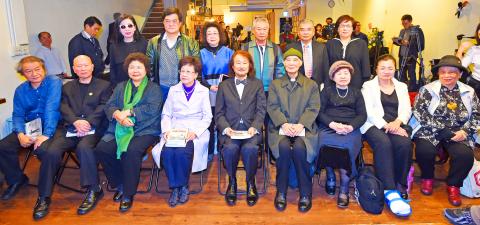|
Democracy activists commemorate Formosa Incident
POSITIVE OUTLOOK: Former DPP chairman Hsu Hsin-liang said the problems which brought about modern day demonstrations would be solved in coming decades
By Loa Iok-sin / Staff reporter

Former Democratic Progressive Party (DPP) chairman Hsu Hsin-liang, Greater Kaoshiung Mayor Chen Chu, former vice president Annette Lu, former DPP chairman Shih Ming-te, Presbyterian Pastor Kao Chun-ming, front row from second to fifth left, and other people associated with the 1979 Kaohsiung Incident pose for a group photograph in Taipei yesterday.
Photo: Liu Hsin-de, Taipei Times
Remembering the past while looking forward to the future, about a dozen former democracy activists gathered in Taipei yesterday to commemorate the 35th anniversary of the Formosa Incident, saying that they are optimistic about the future of Taiwan’s democracy because of recent pro-democracy movements.
The Formosa Incident, also known as the Kaohsiung Incident, involved an anti-government demonstration organized by Formosa Magazine on Dec. 10, 1979. Intended as a march in honor of International Human Rights Day, the event turned violent when members of the crowd unknown to the organizers — and widely believed to have been agents provocateurs — began attacking police. The Chinese Nationalist Party (KMT) government court-martialed and jailed eight activists, who became known as the Kaohsiung Eight.
Speaking at an event in Taipei to commemorate the Incident, and to launch a book on it, former Democratic Progressive Party (DPP) chairman Hsu Hsin-liang (許信良) said that while it is still hard to foresee the outcome of the social movements — including the Sunflower movement, the demonstrations for human rights in military and several other movements for environmental or development issues — he is certain that they will bring about positive reforms to Taiwan’s democracy.
“Most of what we pursued in the pro-democracy movements in the 1970s — such as direct election of the president — came to pass in the 1990s, so I’m sure that the problems facing this generation and which led to the recent social movements will be solved in a few decades, even though we may not foresee what will happen in the end,” Hsu told the audience.
“Issues facing Taiwan today — such as unequal distribution of wealth, cross-strait relations, and economic recession — exist because government leaders in the past two decades never thought about these issues, and therefore it’s natural that the civil society would want reforms,” Hsu said. “I’m optimistic that Taiwan’s democracy will deepen, and we should develop a Western European style of democracy.”
One of the Kaohsiung Eight — Shih Ming-te (施明德), lashed out against President Ma Ying-jeou’s (馬英九) leadership, saying that under Ma, the nation has lost its direction, and that Ma does not know how to handle cross-strait relations well, deals with the economy poorly and actively develops excessively close ties with large corporations.
Former vice president Annette Lu (呂秀蓮), who was another of the eight, thanked the public for remembering the pro-democracy activists of the past.
“I feel honored that we are still remembered,” Lu said. “The meaning behind remembering the Formosa Incident today is to pass on the value that we should always try to light up the world when it’s dark, and we should make it a value instilled in every Taiwanese.”
“No matter how we look forward to the future, we shall remember the past, for those without a sense of history cannot create the future,” she added.
source: Taipei Times
|